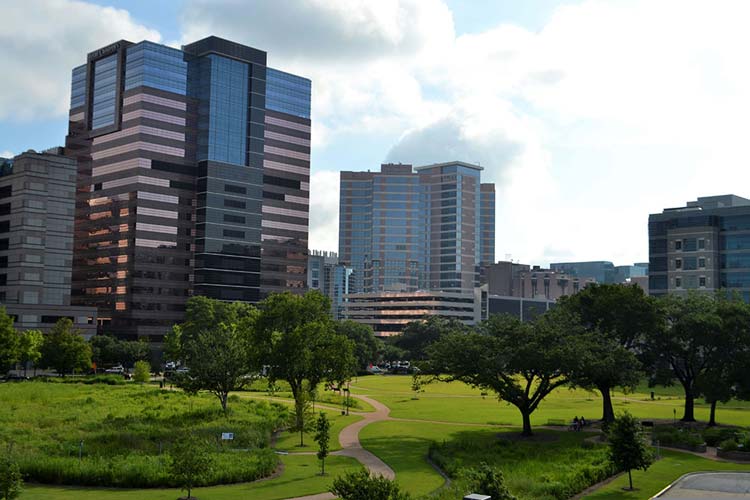Gardens have long been associated with tranquility and nature. But in recent years, commercial gardens have started blooming in corporate campuses, retail spaces, hotels, and other business settings.
These thoughtfully designed green spaces incorporate flowering plants, trees, water features, and walking paths right into a company’s premises. Beyond just being visually appealing, commercial gardens can provide some key benefits for businesses. But how exactly might integrating gardens into your business environment contribute to success? Can the addition of flowering plants, greenery, and outdoor spaces have a measurable positive impact?
Let’s explore the emerging trend of commercial gardens and discuss their potential to boost brand image, customer engagement, talent retention, and even revenues. We’ll examine some of the key considerations for incorporating gardens into your business strategy and look at real-world examples of companies leveraging gardens effectively. The question at hand: are commercial gardens simply an aesthetic extra, or can they provide bottom-line value? Let’s dig in and find out if business is really blooming in today’s corporate gardens.
Enhancing Aesthetic Appeal and Brand Image
Thoughtfully designed commercial gardens vastly improve the curb appeal and visual aesthetic of retail, hospitality, and office environments. Verdant partitions in parking lots, eye-catching botanical displays in hotel lobbies, and Zen rock gardens outside office windows create welcoming first impressions. For retailers, display gardens can showcase merchandise in an authentic setting.
Gardens also allow brands to subtly communicate values around wellness, sustainability, creativity, and community. Edible gardens, native plantings, and rainwater capture systems emphasize eco-consciousness, while meditation spaces among blossoming flowers promote mindfulness. By aligning garden spaces with branding, companies can differentiate themselves from competitors and connect with consumers on a deeper level.
Impact on Employee Wellbeing and Productivity
Research increasingly links exposure to living greenspaces with lower stress, improved mental health, and higher job satisfaction. Natural elements spark creativity while providing relaxing respites from screen fatigue. Gardens can also promote movement, social connections, and a sense of community.
Several studies reveal measurable gains in workplace productivity thanks to gardens. For example, call center employees with views of greenery handle calls faster and have better attendance. The mental restoration, sensory stimulation, and physical movement gardens provide translate directly to higher energy, focus, and innovation.
Attracting and Engaging Customers
Thoughtful gardens create pleasant, Instagram-worthy spaces that attract foot traffic and customer engagement. Retail gardens inspire impulse purchases as people traverse through well-merchandised vignettes. Al fresco restaurant seating immersed in gardens enhances dining occasions. Hotels and spas with tranquil gardens and koi ponds create a destination appeal.
Gardens also provide experiential marketing opportunities, like guided garden tours, floral workshops, harvest festivals, and yoga in the garden. Participatory experiences, especially those shared on social media, deepen customer relationships. Overall, gardens boost leisure time, satisfaction, and repeat business.
Environmental and Social Responsibility
Well-designed gardens give back to the community through improved air quality, stormwater management, urban wildlife habitats, and greenhouse gas absorption. Native, drought-tolerant plants promote biodiversity. Edible gardens and food forests supply produce to neighborhoods facing food insecurity. Gardens also serve as hands-on classrooms for local schools and nonprofits.
Participatory programs like community garden plots or corporate volunteer days in company gardens showcase social responsibility. Responsible water usage, organic techniques, and upcycled materials demonstrate sustainable business practices. For businesses seeking to implement ESG and connect with causes consumers care about, gardens present multifaceted opportunities.
Challenges and Considerations
The costs, space requirements, and maintenance demands of commercial gardens require careful evaluation. Low-maintenance native species, xeriscaping, automatic drip irrigation, and professional landscaping services can optimize costs and labor. Small-scale edible gardens or low-profile green walls provide eco-friendly touches even on tight sites.
Gardens should align with business goals, brand identity, and customer needs rather than being treated as extravagances. Partnerships with nonprofits like botanic gardens or horticultural training programs can offset costs while also driving community engagement. With thoughtful planning, gardens magnify returns across key areas.
Future Trends in Commercial Gardening
The next generation of commercial gardens will likely integrate technology like solar panels, automated watering, and plant sensors to increase efficiency. Shifting architectural norms will make designated green spaces standard in new constructions. With rising urbanization, existing spaces may be retrofitted with multi-level and rooftop gardens.
As climate change concerns grow, nativescaping and foodscaping with resilient plants will gain favor. Workplace preferences for biophilic environments will drive indoor atriums and greenhouse workspaces. Overall, commercial gardens will evolve as valuable assets that support business, community, and planetary health.
Conclusion
Well-designed gardens enrich businesses aesthetically and functionally while conveying brand purpose. They boost worker productivity, customer engagement, and community goodwill. While requiring forethought, gardens magnify value across critical metrics when aligned with business goals and resources. Their multifaceted benefits make gardens a smart, future-focused investment for any business seeking to grow sustainably, responsibly, and successfully. The seeds planted today will yield progress and prosperity well into the future.



